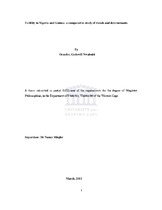| dc.contributor.advisor | Stiegler, Nancy | |
| dc.contributor.author | Osuafor, Godswill Nwabuisi | |
| dc.contributor.other | Dept. of Statistics | |
| dc.contributor.other | Faculty of Arts | |
| dc.date.accessioned | 2014-01-16T11:52:59Z | |
| dc.date.available | 2011/06/20 09:12 | |
| dc.date.available | 2011/06/20 | |
| dc.date.available | 2014-01-16T11:52:59Z | |
| dc.date.issued | 2011 | |
| dc.identifier.uri | http://hdl.handle.net/11394/2589 | |
| dc.description | Magister Philosophiae - MPhil | en_US |
| dc.description.abstract | The present study was conceived to examine the trend and factors affecting fertility in Nigeria and Guinea. Fertility has declined by about nineteen percent in Nigeria between 1982 and 1999. In the same period it has declined by five percent in Guinea. The decline is observed in data from censuses and surveys. Studies have reported that fertility transition is in progress in most Sub-Sahara African countries (Bongaarts 2008; Guttmacher 2008), Nigeria (Feyisetan and Bankole 2002) and Guinea (measuredhs 2007). Studies and surveys done in some regions and among ethnic groups suggest that fertility is declining in Nigeria (Caldwell et al. 1992) and Guinea (measuredhs 2007). However, these studies and surveys are devoid of national representativeness as they are localized in specific regions or selected ethnic groups. Thus, they cannot be used as a national reference. The trend of the total fertility rate (TFR) from the three consecutive Demographic and Health Surveys in Nigeria did not show any meaningful decrease over time. In the same vein, no evidence of fertility decline was observed in Guinea from the Demographic and Health Surveys. The claim that fertility is declining in these two countries which assures the funding organizations that Family Planning programs are successful is beyond the scope of the present study. Based on Demographic and Health Surveys the claim that fertility is decreasing in Nigeria may be misleading, whereas in Guinea fertility has shown stability. This suggests that while the factors affecting fertility may be similar, their impacts differ from country to country. | en_US |
| dc.language.iso | en | en_US |
| dc.publisher | University of the Western Cape | en_US |
| dc.subject | Nigeria | en_US |
| dc.subject | Guinea | en_US |
| dc.subject | Demographic and Health Surveys | en_US |
| dc.subject | Contraceptive | en_US |
| dc.subject | Family-planning | en_US |
| dc.subject | Descriptive-analysis | en_US |
| dc.subject | Cohort | en_US |
| dc.subject | Education | en_US |
| dc.subject | Marital-status | en_US |
| dc.subject | Gender | en_US |
| dc.title | Fertility in Nigeria and Guinea : a comparative study of trends and determinants | en_US |
| dc.type | Thesis | en_US |
| dc.rights.holder | University of the Western Cape | en_US |
| dc.description.country | South Africa | |

